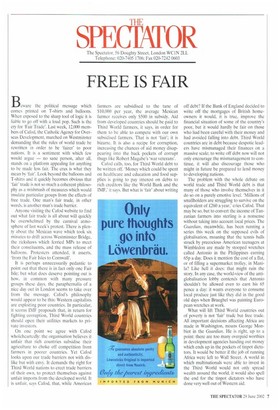SPECIATOR
The Spectator, 56 Doughty Street, London WC1N 2LL Telephone: 020-7405 1706: Fax 020-7242 0603
FREE IS FAIR
Beware the political message which conies printed on T-shirts and balloons. When exposed to the sharp tool of logic it is liable to go off with a loud pop. Such is the cry for 'Fair Trade'. Last week, 12,000 members of Cafod, the Catholic Agency for Overseas Development, marched on Westminster demanding that the rules of world trade be rewritten in order to be 'fairer' to poor nations. It is a sentiment with which few would argue — no sane person, after all, stands on a platform appealing for anything to be made less fair. The crux is what they mean by 'fair'. Look beyond the balloons and T-shirts and it quickly becomes obvious that 'fair' trade is not so much a coherent philosophy as a mishmash of measures which would insulate particular groups from the effects of free trade. One man's fair trade, in other words, is another man's trade barrier.
Anyone visiting the Cafod website to find out what fair trade is all about will quickly be overwhelmed by the carnival atmosphere of last week's protest. There is plenty about the Mexican wave which took six minutes to drift across Westminster Bridge, the rickshaws which ferried MPs to meet their constituents, and the mass release of balloons. Protesters attended, it asserts. 'from the Fair Isles to Cornwall'.
It is perhaps unnecessarily pedantic to point out that there is in fact only one Fair Isle; but what does deserve pointing out is how, in common with many pressure groups these days, the paraphernalia of a nice day out in London seems to take over from the message. Cafod's philosophy would appear to be this: Western capitalists are exploiting poor countries. In particular, it scorns IMF proposals that, in return for fighting corruption, Third World countries should open their utilities markets to private investors.
On one point we agree with Cafod wholeheartedly: the organisation believes it unfair that rich countries subsidise their agriculture to choke off competition from farmers in poorer countries. Yet Cafod looks upon our trade barriers not with dislike but with envy. It demands the right for Third World nations to erect trade barriers of their own, to protect themselves against unfair imports from the developed world. It is unfair, says Cafod, that, while American farmers are subsidised to the tune of $10.000 per year, the average Mexican farmer receives only $500 in subsidy. Aid from developed countries should be paid to Third World farmers, it says. in order for them to he able to compete with our own subsidised farmers. That is not 'fair'; it is bizarre. It is also a recipe for corruption, increasing the chances of aid money disappearing into the back pockets of corrupt thugs like Robert Mugabe's 'war veterans'.
Cafod calls, too, for Third World debt to be written off. 'Money which could be spent on healthcare and education and food supplies is going to pay interest on debts to rich creditors like the World Bank and the IMF,' it says. But what is 'fair' about writing off debt? If the Bank of England decided to write off the mortgages of British homeowners it would, it is true, improve the financial situation of some of the country's poor, but it would hardly be fair on those who had been careful with their money and had avoided falling into debt. Third World countries are in debt because despotic leaders have mismanaged their finances on a massive scale; to write off debt now will not only encourage the mismanagement to continue, it will also discourage those who might in future be prepared to lend money to developing nations.
The problem with the whole debate on world trade and Third World debt is that many of those who involve themselves in it do so on a purely emotive level. 'Millions of smallholders are struggling to survive on the equivalent of £260 a year,' cries Cafod. That may be so, but to convert the income of Tanzanian farmers into sterling is a nonsense without taking into account local prices. The Guardian, meanwhile, has been running a series this week on the supposed evils of globalisation, moaning that the tennis balls struck by precocious American teenagers at Wimbledon are made by stooped wretches called Antonio in the Philippines earning 65p a day. Does it mention the cost of a flat, or of filling a supermarket trolley, in Manila? Like hell it does: that might ruin the story. In any case, the world-view of the antiglobalisation lobby contends that Antonio shouldn't be allowed even to earn his 65 pence a day: it wants everyone to consume local produce just like they did in the good old days when Brueghel was painting European wretches at work.
What will lift Third World countries out of poverty is not 'fair' trade but free trade. All important decisions affecting Africa are made in Washington, moans George Monbiot in the Guardian. He is right, up to a point: there are too many overpaid worthies in development agencies handing out money which ends up in the pockets of tinpot dictators. It would be better if the job of running Africa were left to Wall Street. A world in which multinationals were able to invest in the Third World would not only spread wealth around the world, it would also spell the end for the tinpot dictators who have done very well out of Western aid.


































































 Previous page
Previous page